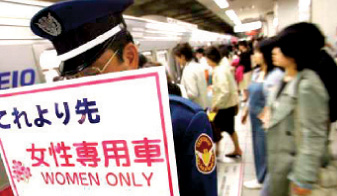Japanese solution to assaults rejected in HK
Updated: 2011-04-07 07:02
(HK Edition)
|
|||||||||
|
A Japanese subway staff member holds a poster as female passengers enter women-only carriages. |
When the Mass Transit Railway (MTR) Corporation officially declined the Legislative Council's (LegCo) proposal to installing women-only carriages in January 2011, there was almost no objection - not among women.
"Implementing women-only carriages does not mean an end to lewd conduct in general," said Amy Yeung, executive secretary of the Association for the Advancement of Feminism, adding that education and enforcement of stricter law is much more effective.
"I am much more prone to the idea of creating an environment in public transportation where women learn to protect themselves," said Linda Wong of the Association Concerning Sexual Violence against Women, referring to special training of MTR staff members about how to deal with urgent cases of sexual assault, and posting signs reminding passengers of paying attention to potential assaults.
"I think that the idea of women-only carriage signals a presumption that women are on the weak side," she said.
Stephen Robert Nagy, assistant professor of Department of Japanese Studies at the Chinese University of Hong Kong, examined the idea.
"It's definitely an initiative to deal with lewd conduct, and women in Japan generally appreciate it," he said, referring to the women-only carriages in Japan, which were first adopted in 2001.
"It's 100 percent effective in the women-only carriages," said Nagy, adding that there was no case of sexual assault reported in these carriages. Nor has there been any situation in which male passengers have proven unwilling to move out of the women-only carriages when mistakenly enter.
However, women-only carriages are not on every train line of every city in Japan. According to Nagy, whether the installment is necessary varies from different districts, factoring in the different population sizes and how prosperous the district is. Besides, some women-only carriages are effective only during rush hours.
In November 2010, China Daily reported that an online and telephone poll showed 81 percent of the cases of indecent assaults took place on the subway.
The MTR Corporation however disputed the findings, arguing that crimes involving sexual assaults only made up 1.3 percent of the total number of crimes in Hong Kong in 2010.
Online public opinions in Hong Kong almost converged on disapproving women-only carriages. Many questioned associated problems, such as bringing inconvenience to the male travelers during peak hours.
The same concern also exists in Tokyo, where the subway sees an average of eight million passengers every day, the second highest in the world, according to reports. By comparison, the MTR in Hong Kong carries about four million passengers a day, according to the company.
Skeptics also contended that sexual assaults on public transportation is not as severe as it is in Japan.
"In Japan, there had been prominent cases when men were conducting sexual assaults in the public area in various sophisticated ways which caught the media and people's attention," said Nagy, explaining the situation in Japan before the installment.
Andrea Deng
(HK Edition 04/07/2011 page4)
